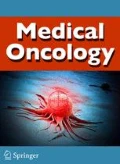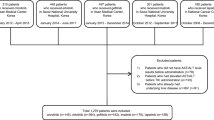Abstract
Crizotinib is an orally available tyrosine kinase inhibitor for patients with anaplastic lymphoma kinase-positive non-small cell lung cancer (NSCLC). Despite that crizotinib-induced hepatotoxicity may cause a dose reduction or interruption that can affect the patient’s treatment, there is no study to investigate factors for crizotinib-induced hepatotoxicity. The purpose of this study was to evaluate factors affecting crizotinib-induced hepatotoxicity. From February 2012 to April 2018, a retrospective study was performed on NSCLC patients treated with crizotinib. Various factors were reviewed including sex, age, body weight, height, body surface area, underlying disease, smoking history, genetic mutation, and concomitant drugs. Among 153 patients, incidence of crizotinib-induced hepatotoxicity of grade I or higher was 83% (n = 127). The presence of liver disease or HBV revealed significant effect on hepatotoxicity within 28 days after crizotinib administration in univariate analysis. Patients with liver disease or HBV carriers revealed 2.3 times the hazard of time to hepatotoxicity compared to those without liver disease or HBV. Use of H2-antagonist or H2-antagonist/proton pump inhibitor revealed 1.7 times the hazard of time to hepatotoxicity compared to those that did not use those medications. Thus, close monitoring of liver function is recommended, especially in patients with liver impairment or using anti-acid secreting agents.

Similar content being viewed by others
References
Huang X. The potential role of HGF-MET signaling and autophagy in the war of alectinib versus crizotinib against ALK-positive NSCLC. J Exp Clin Cancer Res. 2018;37(1):33.
Girard N, Audigier-Valette C, Cortot AB, Mennecier B, Debieuvre D, Planchard D, et al. ALK-rearranged non-small cell lung cancers: how best to optimize the safety of crizotinib in clinical practice? Expert Rev Anticancer Ther. 2015;15(2):225–33.
Mao J, Johnson TR, Shen Z, Yamazaki S. Prediction of crizotinib-midazolam interaction using the Simcyp population-based simulator: comparison of CYP3A time-dependent inhibition between human liver microsomes versus hepatocytes. Drug Metab Dispos. 2013;41(2):343–52.
Malik SM, Maher VE, Bijwaard KE, Becker RL, Zhang L, Tang SW, et al. Food and Drug Administration approval: crizotinib for treatment of advanced or metastatic non-small cell lung cancer that is anaplastic lymphoma kinase positive. Clin Cancer Res. 2014;20(8):2029–34.
Solomon BJ, Kim DW, Wu YL, Nakagawa K, Mekhail T, Felip E, et al. Final overall survival analysis from a study comparing first-line Crizotinib versus chemotherapy in ALK-mutation-positive non-small-cell lung cancer. J Clin Oncol. 2018;36(22):2251–8.
Solomon BJ, Mok T, Kim DW, Wu YL, Nakagawa K, Mekhail T, et al. First-line crizotinib versus chemotherapy in ALK-positive lung cancer. N Engl J Med. 2014;371(23):2167–77.
Ettinger DS, Aisner DL, Wood DE, Akerley W, Bauman J, Chang JY, et al. NCCN guidelines insights: non-small cell lung cancer, version 5.2018. J Natl Compr Canc Netw. 2018;16(7):807–21.
Rothenstein JM, Letarte N. Managing treatment-related adverse events associated with Alk inhibitors. Curr Oncol. 2014;21(1):19–26.
Kazandjian D, Blumenthal GM, Chen HY, He K, Patel M, Justice R, et al. FDA approval summary: crizotinib for the treatment of metastatic non-small cell lung cancer with anaplastic lymphoma kinase rearrangements. Oncologist. 2014;19(10):e5–11.
Mok T, Kim DW, Wu Y-L, Solomon BJ, Nakagawa K, Mekhail T, et al. First-line crizotinib versus pemetrexed–cisplatin or pemetrexed–carboplatin in patients (pts) with advanced ALK-positive non-squamous non-small cell lung cancer (NSCLC): results of a phase III study (PROFILE 1014). J Clin Oncol. 2014;32:8002.
Blackhall F, Kim DW, Besse B, Nokihara H, Han JY, Wilner KD, et al. Patient-reported outcomes and quality of life in PROFILE 1007: a randomized trial of crizotinib compared with chemotherapy in previously treated patients with ALK-positive advanced non-small-cell lung cancer. J Thorac Oncol. 2014;9(11):1625–33.
Park YH, Cho S, Yee J, Kim JY, Rhie SJ, Gwak HS. Factors affecting time to reach and recover from gefitinib-induced hepatotoxicity. Anticancer Drugs. 2018;29(5):471–6.
Timm A, Kolesar JM. Crizotinib for the treatment of non-small-cell lung cancer. Am J Health Syst Pharm. 2013;70(11):943–7.
Fujiwara Y, Hamada A, Mizugaki H, Aikawa H, Hata T, Horinouchi H, et al. Pharmacokinetic profiles of significant adverse events with crizotinib in Japanese patients with ABCB1 polymorphism. Cancer Sci. 2016;107(8):1117–23.
Johnson TR, Tan W, Goulet L, Smith EB, Yamazaki S, Walker GS, et al. Metabolism, excretion and pharmacokinetics of [14C]crizotinib following oral administration to healthy subjects. Xenobiotica. 2015;45(1):45–59.
Tang SC, Nguyen LN, Sparidans RW, Wagenaar E, Beijnen JH, Schinkel AH. Increased oral availability and brain accumulation of the ALK inhibitor crizotinib by coadministration of the P-glycoprotein (ABCB1) and breast cancer resistance protein (ABCG2) inhibitor elacridar. Int J Cancer. 2014;134(6):1484–94.
Hodges LM, Markova SM, Chinn LW, Gow JM, Kroetz DL, Klein TE, et al. Very important pharmacogene summary: ABCB1 (MDR1, P-glycoprotein). Pharmacogenet Genomics. 2011;21(3):152–61.
Budha NR, Frymoyer A, Smelick GS, Jin JY, Yago MR, Dresser MJ, et al. Drug absorption interactions between oral targeted anticancer agents and PPIs: is pH-dependent solubility the Achilles heel of targeted therapy? Clin Pharmacol Ther. 2012;92(2):203–13.
van Leeuwen RW, van Gelder T, Mathijssen RH, Jansman FG. Drug–drug interactions with tyrosine-kinase inhibitors: a clinical perspective. Lancet Oncol. 2014;15(8):e315-26.
Author information
Authors and Affiliations
Corresponding author
Ethics declarations
Conflict of interest
The authors declare that they have no conflicts of interest.
Ethical approval
All procedures performed in studies involving human participants were in accordance with the ethical standards of the institutional and/or national research committee and with the 1964 Helsinki declaration and its later amendments or comparable ethical standards. For this type of study formal consent is not required.
Informed consent
The Asan Medical Center Clinical Research Ethics Committee approved this study and waived the requirement for informed consent due to the retrospective nature of the study with collection of anonymous-subject data (IRB Number: 2018-0339).
Rights and permissions
About this article
Cite this article
Jung, D., Han, J.M., Yee, J. et al. Factors affecting crizotinib-induced hepatotoxicity in non-small cell lung cancer patients. Med Oncol 35, 154 (2018). https://doi.org/10.1007/s12032-018-1213-5
Received:
Accepted:
Published:
DOI: https://doi.org/10.1007/s12032-018-1213-5




